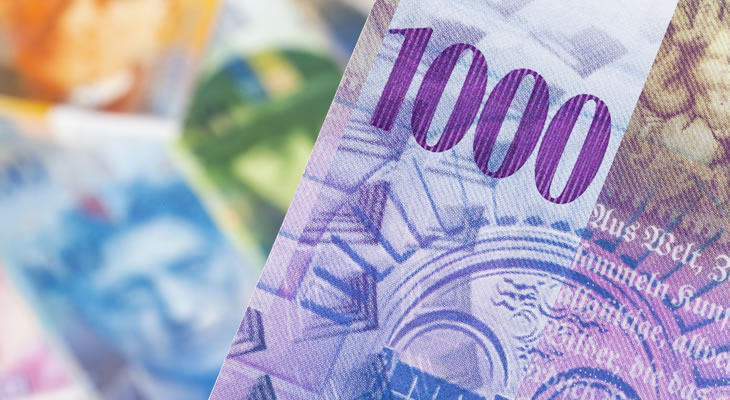- Slowing Chinese imports boosted safe-haven demand – Franc advanced on weakening in market confidence
- Pound on mixed form as Theresa May assumed position of Prime Minister – Initial relief rally died back as Brexit concerns persisted
- BoE surprised markets by leaving interest rates on hold for another month – Pound surged in relief at lack of rate cut
- GBP CHF exchange rate forecast to weaken on slower Chinese growth – Safe-haven appeal likely to rise in response to fresh signs of slowdown
In spite of market expectations for interest rates to be lowered to a fresh record low the Bank of England made no change to monetary policy at its July meeting, prompting the GBP CHF exchange rate to trend strongly higher.
Chinese Import Contraction Boosted Swiss Franc (CHF) on Safe-Haven Sentiment
An unexpectedly severe contraction in Chinese imports prompted a sharp increase in safe-haven demand on Wednesday. With the world’s second largest economy showing fresh signs of weakness investors were prompted to move back into safe-haven assets, shoring up the Swiss Franc (CHF). Weakness in the Euro (EUR) also helped to boost the Franc, with poor Eurozone Industrial Production figures pointing towards a slowdown of growth within the currency union. Altogether this improved the appeal of the lower-risk Franc, particularly with gold prices recovering ground from last week’s dip in value.
Confidence in the Pound (GBP) was weakened, meanwhile, by a worrying Credit Suisse survey, which pointed towards a marked softening in corporate sentiment. Two-thirds of respondents indicated that they would be postponing or even reducing spending in the next six months, a less-than-positive sign for the UK economy. Hiring plans were also indicated to have been dialled back in response to the Brexit vote, something which could negatively impact the domestic employment market in the coming months and exacerbate other slowdown pressures.
However, the Pound to Swiss Franc (GBP CHF) exchange rate failed to turn bullish later in the day, with market confidence weakening ahead of the appointment of Theresa May as Prime Minister. As May had previously noted an intention not to invoke Article 50 before the end of the year, preventing formal exit negotiations from commencing, this somewhat dampened the earlier optimistic mood.
GBP CHF Exchange Rate Surged after BoE Failed to Cut Interest Rates
Overnight the RICS House Price Balance was found to have weakened less than investors had anticipated, clocking in at 16% rather than 10%. While this did confirm that the domestic housing market had weakened in June, and it is thought to have suffered further in the wake of the referendum result, this failed to weigh on the Pound for long.
The appeal of the Franc, on the other hand, was diminished by the latest Swiss Producer and Import Price data. Even though the yearly figure showed some limited improvement this was overshadowed by a sharper-than-expected decline on the month in June. With prices falling back from 0.4% to just 0.1% this did not bode well for the domestic inflationary outlook, weakening the Franc as wider market sentiment turned more bullish.
Comments from new Chancellor of the Exchequer Phillip Hammond helped to encourage greater demand for the Pound, meanwhile, with markets reacting positively to the removal of George Osborne. As Kit Juckes, Research Analyst at Societe Generale, noted:
‘Mr Hammond has already said there won’t be an emergency Budget, and he’s already praised BOE Governor Carney (ahead of today’s MPC meeting). There is an opportunity (and a need) for the UK to counter the post-referendum economic slowdown with a more expansionary fiscal stance and were that to happen, it would be positive for Sterling.’
Demand for the Pound surged dramatically, however, when the Bank of England (BoE) surprised markets by leaving interest rates unchanged once again. Investors had generally predicted that policymakers would opt to lower rates to a fresh historic low, in light of recent volatility and economic uncertainty. Ultimately only one member of the Monetary Policy Committee (MPC) voted to ease at this juncture, prompting the GBP CHF exchange rate to climb to a daily best of 1.3204.
GBP CHF Exchange Rate Forecast: Weaker Chinese or US Data Could Boost Franc Demand
There is no further Swiss or UK data of particular note set for release ahead of the weekend, with investor sentiment likely to be the main influence on the GBP CHF exchange rate. Further developments in the UK political scene could provoke additional Pound volatility, although some of the market excitement could die down once the full cabinet line-up is confirmed. Any comments on Brexit are also expected to provoke investor reaction, with the Pound still biased to the downside.
Of particular note for the Franc will be the second quarter Chinese GDP report and accompanying domestic data. Fresh signs of weakness in the world’s second largest economy would boost safe-haven demand further, with slowdown concerns expected to weigh heavily on investors’ minds in the current market atmosphere. Discouraging US ecostats could also provide support to the Franc on Friday, although an uptick in US inflation could dent the appeal of the ‘Greenback’s safe-haven rival.
Current GBP, CHF Exchange Rates
At the time of writing, the Pound to Swiss Franc (GBP CHF) exchange rate was trending strongly in the region of 1.3046, while the Swiss Franc to Pound (CHF GBP) pairing was slumped around 0.7660.


Comments are closed.